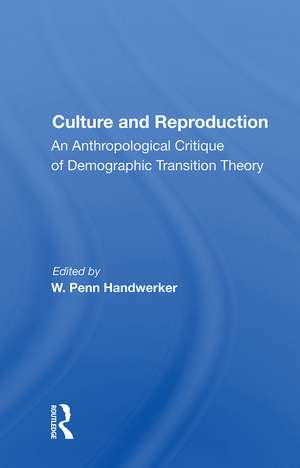Culture And Reproduction: An Anthropological Critique Of Demographic Transition Theory
Editat de W. Penn Handwerkeren Limba Engleză Hardback – 7 iun 2019
Preț: 764.20 lei
Preț vechi: 1027.43 lei
-26% Nou
Puncte Express: 1146
Preț estimativ în valută:
146.25€ • 152.12$ • 120.74£
146.25€ • 152.12$ • 120.74£
Carte tipărită la comandă
Livrare economică 14-28 aprilie
Preluare comenzi: 021 569.72.76
Specificații
ISBN-13: 9780367008833
ISBN-10: 0367008831
Pagini: 414
Dimensiuni: 147 x 229 mm
Greutate: 0.45 kg
Ediția:1
Editura: Taylor & Francis
Colecția Routledge
Locul publicării:Oxford, United Kingdom
ISBN-10: 0367008831
Pagini: 414
Dimensiuni: 147 x 229 mm
Greutate: 0.45 kg
Ediția:1
Editura: Taylor & Francis
Colecția Routledge
Locul publicării:Oxford, United Kingdom
Cuprins
Errata -- Foreword -- Preface -- Culture and Reproduction: Exploring Micro/Macro Linkages -- Micro–Level Issues -- Rationality and Models of Reproductive Decision–Making -- Biological Determinants of Fecundity and Fecundability: An Application of Bongaarts' Model to Forager Fertility -- A Comment on the Determinants !Kung Fertility -- Rejoinder to Bongaarts -- "Natural Fertility" as a Balance of Choice and Behavioral Effect: Policy Implications for Liberian Farm Households -- Transformation in the Natural Fertility Regime of Western Alaskan Eskimo -- Price or Production? Domestic Economies, Household Structure, and Fertility in a Guatemalan Village -- Fertility and Historical Variation in Economic Strategy Among Migrants to the Lacandon Forest, Mexico -- Cultural Constraints on Fertility Transition in Tunisia: A Case–Analysis from the City of Ksar–Hellal -- Micro/Macro–Level Linkages -- Resources, Rivalry, and Reproduction: The Influence of Basic Resource Characteristics on Reproductive Behavior -- Potatoes, Population, and the Irish Famine: The Political Economy of Demographic Change -- Contraception, Ideology, and Policy Formation: Cohort Change in Dublin, Ireland -- Economic Diversity, Family Strategy, and Fertility in a Mexican-American Community -- Labor Expropriation and Fertility: Population Growth in Nineteenth Century Java -- The Political Economy of Fertility Regulation: The Kusasi of Savanna West Africa (Ghana) -- Agricultural Intensification and Fertility in The Gambia (West Africa) -- Temne Fertility: Rural Continuity, Urban Change, Rural-Urban Differences, and Public Policy Problems
Descriere
World population growth, especially its fertility component, poses a major dilemma for policymakers throughout the world. However, theoretical developments in demography have not yet provided a solid foundation for understanding contemporary population processes. From an anthropological perspective, the current micro-level models do not properly recognize the cultural and biological constraints within which people make reproductive decisions. On the macro level, demographic transition continues to be linked to processes of "modernization." Arguing that it is necessary to readdress micro-level issues in light of the cultural-historical variability of particular places and times and to explore linkages between macro- and micro-level phenomena through which population processes work themselves out, the contributors point the way to new theoretical formulations of the concept of culture, the nature of macro/micro linkages, and methods of placing demographic theory within the more encompassing framework of evolutionary theory.
